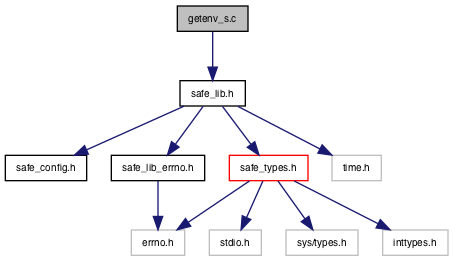#include "safe_lib.h" Include dependency graph for getenv_s.c:
Include dependency graph for getenv_s.c:Functions | |
| EXPORT errno_t | getenv_s (size_t *restrict len, char *restrict dest, rsize_t dmax, const char *restrict name) |
The getenv_s function searches for an environmental variable with name name in the host-specified environment list and returns a pointer to the string that is associated with the matched environment variable. More... | |
Function Documentation
◆ getenv_s()
| EXPORT errno_t getenv_s | ( | size_t *restrict | len, |
| char *restrict | dest, | ||
| rsize_t | dmax, | ||
| const char *restrict | name | ||
| ) |
The getenv_s function searches for an environmental variable with name name in the host-specified environment list and returns a pointer to the string that is associated with the matched environment variable.
The set of environmental variables and methods of altering it are implementation-defined. The value of the environment variable is written to the user-provided buffer value (unless null) and the number of bytes written is stored in the user-provided location *len (unless null). If the environment variable is not set in the environment, zero is written to *len (unless null) and '\0' is written to value[0] (unless null). With SAFECLIB_STR_NULL_SLACK defined all elements following the terminating null character (if any) written in the array of dmax characters pointed to by dest are nulled. If secure_getenv() is available, it is used.
- Remarks
- SPECIFIED IN
- C11 standard (ISO/IEC 9899:2011): K.3.6.2.1 The getenv_s function (p: 607-607) http://en.cppreference.com/w/c/program/getenv
- Parameters
-
[out] len pointer to a size_t where getenv_s will store the length of the found environment variable. Might be NULL. [out] dest pointer to a string where getenv_s will store the contents of the found environment variable. [in] dmax maximum number of characters that getenv_s is allowed to write to dest (size of the buffer). [in] name null-terminated character string identifying the name of the environmental variable to look for.
- Precondition
- name and dest shall not be a null pointer.
- dmax shall not be greater than RSIZE_MAX_STR.
- dmax shall not equal zero.
- dmax shall be greater than the strlen of the returned env value.
- Returns
- zero if the environment variable was found, non-zero if it was not found of if a runtime constrant violation occurred. On any error, writes zero to *len (unless len is a null pointer).
- Return values
-
EOK on success -ESNULLP when dest or name are a NULL pointer -ESZEROL when dmax = 0 -ESLEMAX when dmax > RSIZE_MAX_STR -ESNOSPC when dmax is too small for the value -1 when not found
